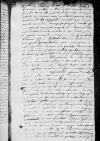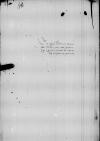List #2064
Ioannes DANTISCUS do Tiedemann GIESEWartenburg (Barczewo), 1539-01-27
Regest polski:
Dantyszek zawiadamia Giesego o otrzymanych dzień wcześniej licznych listach z Krakowa. Wbrew jego oczekiwaniom nie poruszały one sprawy przechowywania pieniędzy z podatku. Przypuszcza, że wynika to ze wstępnej zgody na odłożenie sprawy do kolejnego sejmu [pruskiego]. Zgoda ta zależy jednak od tego, czy dotrze w porę na dwór list panów [pruskich].
Dantyszek uskarża się na postawę większości członków Rady Pruskiej, zwłaszcza zaś przedstawicieli rady Torunia i wojewody pomorskiego [Jerzego Konopackiego], który publicznie twierdzi, jakoby nic nie wiedział o piśmie wysłanym na dwór z sejmu grudziądzkiego.
Dantyszek odkłada omówienie wielu innych kwestii do osobistego spotkania z adresatem.
Zdaniem Dantyszka sprawy [pruskie] idą w złym kierunku. Na obradującym w Krakowie sejmie koronnym dąży się do obciążenia mieszkańców Prus nowymi kosztami i zrównania ich we pod każdym względem z mieszkańcami Królestwa.
Przybyły w ostatnich dniach Fabian Wojanowski (Damerau) przekazał Dantyszkowi odpowiedź królowej [Bony Sforzy], która tak jak wcześniej obarcza go odpowiedzialnością za wszystko, co dzieje się w Prusach i zarzuca mu, że bez zgody innych kazał napisać do króla [Zygmunta I] z sejmu [pruskiego]. Według królowej [w Prusach Królewskich] nikt poza wojewodą pomorskim [Jerzym Konopackim] i [starostą] brodnickim [Mikołajem Działyńskim] nie dba o interesy i autorytet królewski. W imieniu króla napisano jednak Dantyszkowi, by nie brał sobie tych opinii do serca.
Idąc za przykładem większości, Dantyszek, zamierza wkrótce wysłać pieniądze z podatku do Malborka, co doradza też innym. Uważa jednak, że panowie [pruscy] powinni opisać całą sprawę królowi, prosząc, aby na następnym sejmie nakazał poważnie podejść do sprawy rozliczenia - dzięki czemu będzie wiadomo, ile każdy zapłacił - a także zażegnać spory między szlachtą a mieszczanami o warzenie piwa.
Dantyszek informuje, że na sejmie krakowskim postanowiono o obronie przed Turkami. Jej koszty ponosić mają także duchowni oraz mieszkańcy Prus [Królewskich] obu stanów.
Przeczytawszy najświeższy list Giesego, Dantyszek odradza mu, by sam pisał do króla w imieniu panów pruskich, ponieważ ściągnie na siebie niechęć dworu. Jego zdaniem list należy napisać od nowa zgodnie z radą kasztelana gdańskiego [Achacego Cemy] oraz jak najszybciej zawiadomić o nim miasta. Zebrane już pieniądze trzeba bezzwłocznie wysłać do Malborka. Winę za taki obrót spraw ponosi wyłącznie wojewoda pomorski.
Rękopiśmienne podstawy źródłowe:
Publikacje:
| ||||||||||
Tekst + aparat krytyczny + komentarzZwykły tekstTekst + komentarzTekst + aparat krytyczny
Reverendissimo in Christo Patri et Domino, domino
Reverendissime in Christo Pater et Domine, frater et amice carissime et honoran(de) or honoran(dissime)⌈honoran(de)honoran(de) or honoran(dissime)⌉.
Salutem et fraterni amoris commendationem etc.
Pridie cf.
Hic multa omitto usque ad nostrum aliquando colloquium.
Res nostrae certe inclinant. Quare et nunc in
Venit praeterea ad me dominus
Ceterum, cum videam maiorem ordinum nostrorum partem pecuniam collectam  BCz, 245, p. 116 saltem pro nobis egisse videamur), quin serenissimae
BCz, 245, p. 116 saltem pro nobis egisse videamur), quin serenissimae
ms 1 quide[...] hidden by binding⌈quidemms 2 quidem,
ms 1 quide[...] hidden by binding⌉ deinceps licebit etc.
Quae
ms 1 [...]untur hidden by binding⌈agunturms 2 aguntur,
ms 1 [...]untur hidden by binding⌉, sic habent in summa: proposita est ms 2 defensio,
ms 1 defe[n]sio hidden by binding⌈defensioms 2 defensio,
ms 1 defe[n]sio hidden by binding⌉ contra
Quam felicissime diutissimeque valere cupio ex animo.
Dat(ae) or Dat(um)⌈Dat(ae)Dat(ae) or Dat(um)⌉
Reverendissimae Dominationis Vestrae deditissimus frater
Postscript:
 BCz, 245, p. 1 not numbered after f. 148 (f. 80r according to previous foliation)
BCz, 245, p. 1 not numbered after f. 148 (f. 80r according to previous foliation)
Postquam
ms 2 non⌈iamms 1 iam,
ms 2 non⌉ collectam, cum iam maior eius pars sit in



